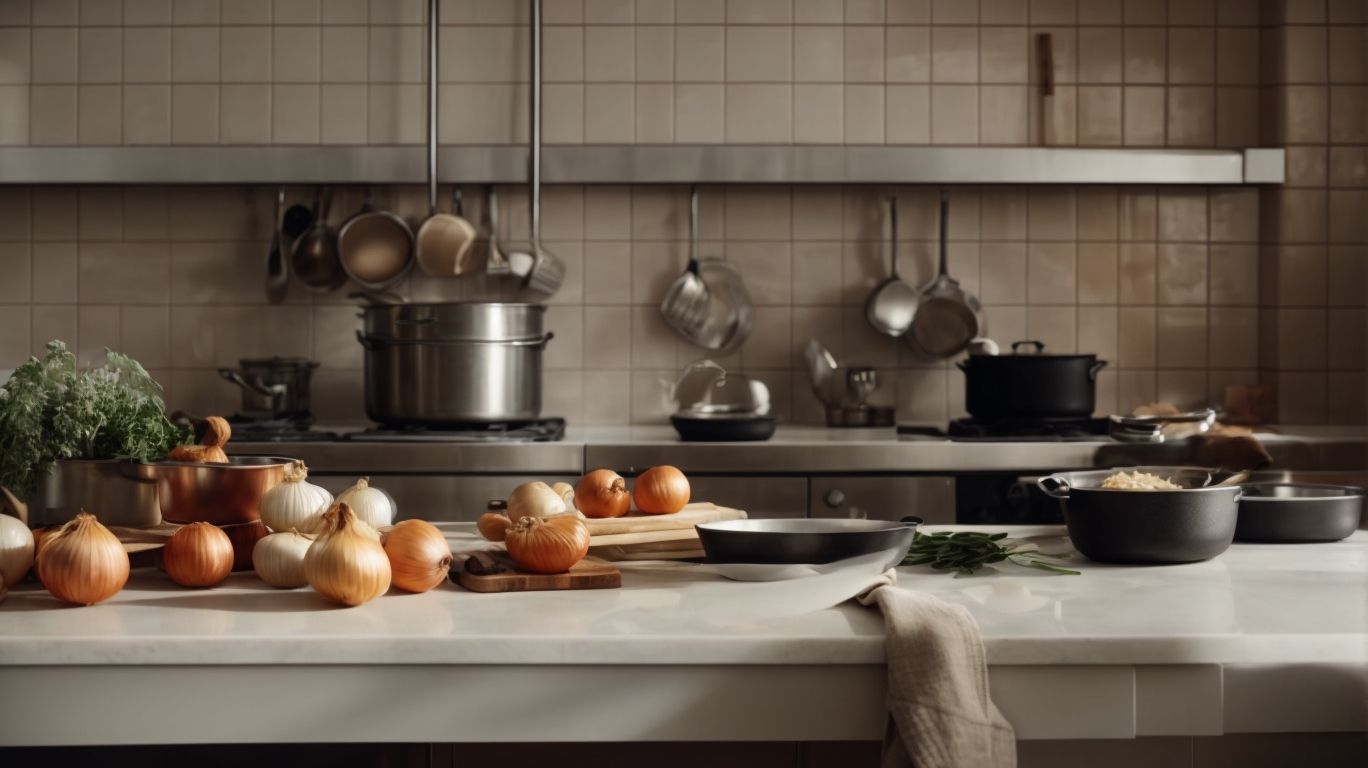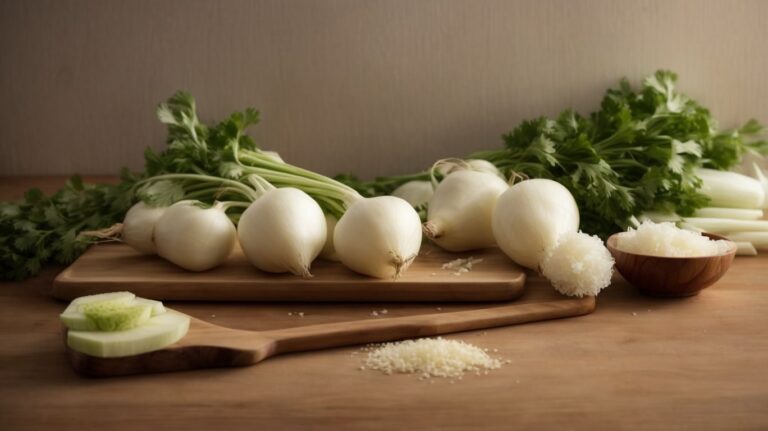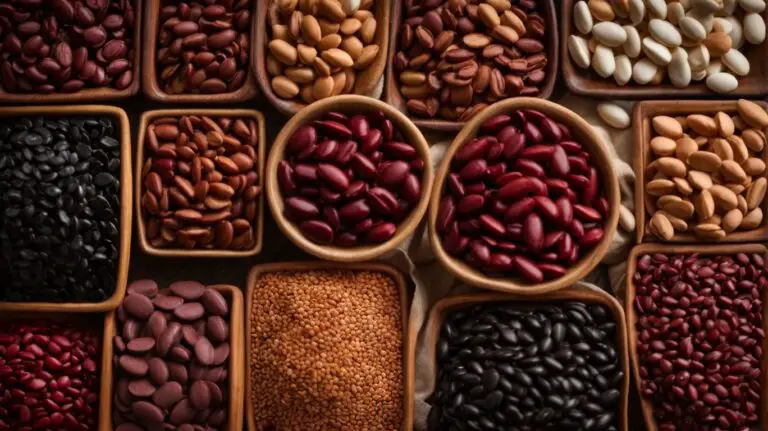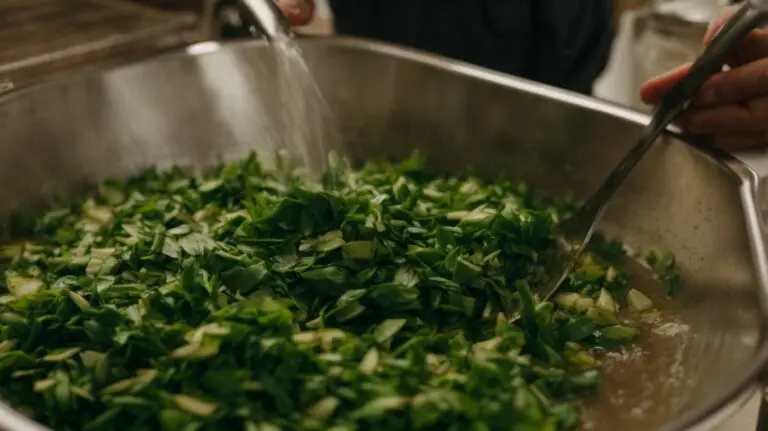How to Cook Onions Without Smelling Up the House?
Are you tired of your house smelling like onions every time you cook?
We explore the reasons why onions produce such a strong odor and provide practical tips on how to minimize it.
From cutting the onions under running water to cooking with a lid on, we’ve got you covered.
We share alternative methods to cook onions without the lingering smell. Say goodbye to onion-scented homes and enjoy delicious onion-flavored dishes odor-free.
Key Takeaways:
Why Do Onions Make Your House Smell?
The aroma of onions wafting through your home can be attributed to the release of pungent compounds when onions are chopped or cooked.
When onions are cut or crushed, enzymes stored in separate cellular compartments mix, leading to a cascade of reactions where amino acid sulfoxides are converted into sulfenic acids. These sulfenic acids spontaneously rearrange into a volatile compound known as syn-propanethial-S-oxide, which is responsible for that eye-watering effect while chopping onions, and also the characteristic smell permeating the kitchen. This compound easily becomes airborne, dispersing through the air and clinging to surfaces, lingering in the kitchen and beyond.
How to Avoid the Smell of Onions While Cooking?
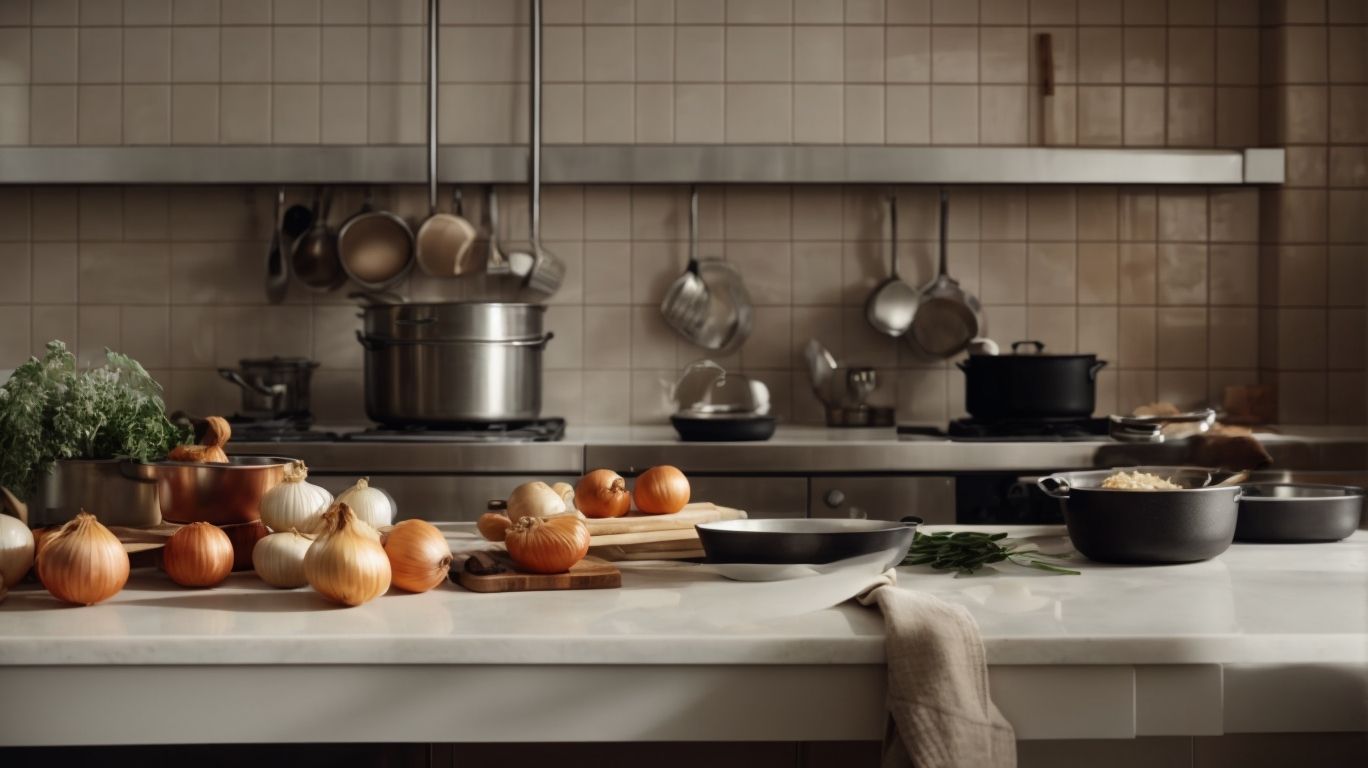
Credits: Poormet.Com – John Walker
When cooking onions, there are several techniques and tips you can employ to minimize or eliminate the lingering smell in your kitchen.
One effective method is to use vinegar while cooking onions. Simply adding a splash of vinegar to the onions as they cook can help reduce the strong odor. Another trick is to squeeze some lemon juice over the onions, which can also help neutralize the smell. Consider cooking onions over low heat to release their flavors more gently, reducing the intensity of the odor. Utilizing a range hood or opening windows to improve ventilation can also prevent the smell from lingering in your kitchen.
Cut the Onions Under Running Water
One effective method to reduce onion odors is by cutting the onions under running water, which helps to wash away some of the odor-causing compounds.
When you cut onions under running water, the water helps to carry away the volatile sulfur compounds responsible for the pungent smell.
Using a cutting board under the stream of water ensures easy cleanup and prevents the released odors from lingering in the air.
This technique not only minimizes the discomfort of tearing up while chopping onions but also keeps your kitchen environment odor-free.
Use a Sharp Knife
Using a sharp knife when cutting onions can help minimize cell damage and reduce the release of odorous compounds.
When you use a sharp knife, it smoothly slices through the onion’s cell walls without crushing them. This minimizes the rupturing of cell membranes, which in turn helps retain more of the onion’s natural juices and flavors.
This precise cutting also reduces the cell damage that occurs when using a dull blade, leading to less tearing of the onion’s cells and thereby potentially less release of pungent compounds that cause eye irritation.
By preserving the cell structure of the onion, using a sharp knife allows you to enjoy a more flavorful and visually appealing dish, enhancing the overall culinary experience.
Chill the Onions Before Cutting
Chilling onions before cutting can help decrease their volatility, leading to fewer odors being released during chopping or cooking.
When you store the onions in the fridge, the cold temperature helps to slow down the enzymatic reactions that produce volatile compounds responsible for the pungent odor. By chilling the onions, you are essentially putting a damper on these reactions, minimizing the release of gases that can make your eyes water while cutting them. It’s a simple but effective trick to make the chopping process more pleasant and tear-free. So, next time you reach for an onion, consider giving it a quick chill in the refrigerator before braving its potent flavor and aroma.
Cook with a Lid On
Cooking onions with a lid on the pan can trap some of the odors and prevent them from spreading throughout the kitchen.
By keeping the lid on while cooking onions, you not only contain the strong smell but also help the onions cook more evenly. The trapped steam aids in softening the onions without the need for excessive oil or added moisture. This method also allows the onions to caramelize beautifully, enhancing their natural sweetness and flavor. To further reduce odors, adding a splash of vinegar or citrus juice to the pan while cooking can help neutralize any lingering smells. For optimal results, maintain the lid on until the onions are completely cooked through.
Add Acidic Ingredients
Incorporating acidic ingredients like vinegar or lemon can help neutralize the pungent onion odor and add a fresh aroma to your dishes.
When vinegar is used in cooking, its acidity helps to mask the strong smell of onions, creating a more balanced flavor profile. Similarly, lemon juice can cut through the overpowering onion scent, imparting a zesty brightness to your dishes. Experimenting with different acidic components not only enhances the taste but also elevates the overall dining experience.
Use a Ventilation System or Fan
Utilizing a ventilation system or fan while cooking onions can help circulate the air and remove odors from the kitchen.
Proper ventilation is key to maintaining a fresh and pleasant kitchen environment. When you cook, especially with ingredients like onions and spices that release strong odors, having a well-functioning ventilation system or fan can make a significant difference in air quality. Fans or range hoods are designed to pull out the cooking odors and grease particles, preventing them from lingering in the air and settling on surfaces. They help reduce moisture levels, which can contribute to mold growth and other issues.
Cook Outside
A simple solution to avoid onion odors indoors is to cook outside, allowing the strong smells to dissipate in the open air.
When you cook outside, not only do you eliminate the lingering smell of onions from your home, but you also get to enjoy the benefits of outdoor cooking. The fresh air enhances the flavor of your dishes, making your culinary creations even more delicious.
Setting up an outside cooking area can also give you a change of scenery and create a fun cooking experience. You can use a portable grill, a fire pit, or even a camping stove to prepare your meals away from the indoor kitchen.
Alternative Methods to Cooking Onions Without Smell

Credits: Poormet.Com – Alan Rodriguez
If you’re looking to enjoy onion-flavored dishes without the lingering smell, there are alternative methods and ingredients you can use to achieve flavorful results.
One effective technique is to caramelize the onions slowly over low heat, which not only enhances their natural sweetness but also reduces the strong odor they emit during cooking. Incorporating other aromatic ingredients like garlic, shallots, or leeks can help mask the pungent smell of onions while adding depth to the dish. Another approach is to substitute green onions or chives in recipes that call for regular onions, as these milder alternatives can provide a similar flavor profile without the overpowering smell.
Use Onion Powder or Flakes
Substituting fresh onions with onion powder or flakes can offer a convenient way to infuse dishes with onion flavor without the lingering smell.
Additionally,
- Onion powder or flakes provide a consistent flavor profile, ensuring that each bite carries the desired onion essence.
- They also have a longer shelf life compared to fresh onions, making them a cost-effective and practical pantry staple.
- From soups and stews to marinades and rubs, incorporating onion powder or flakes can elevate the taste of a wide range of dishes effortlessly.
- One useful tip is to bloom the powder in oil or other fats before adding other ingredients to unleash its full flavor potential.
Try Shallots or Leeks
Exploring alternatives like shallots or leeks in place of onions can introduce unique flavors to your recipes while minimizing strong odors.
Shallots are milder and sweeter than onions, adding a subtle, delicate flavor to dishes, while leeks offer a mild onion-garlic taste, providing a more nuanced profile. When using shallots, consider their papery skin and multi-layered structure, slicing them thinly for a delicate touch. Leeks, on the other hand, require careful cleaning to remove dirt trapped between the layers.
In cooking, shallots are excellent in dressings, sauces, or caramelized to accompany meats. Leeks shine in soups, stews, and gratins, imparting a lovely sweetness. Try using shallots in a creamy mushroom risotto or adding leeks to a hearty potato leek soup for a comforting meal.
Use a Slow Cooker
Opting for a slow cooker to prepare onion-based dishes can help contain odors and slowly infuse flavors without overwhelming your kitchen with strong smells.
Slow cooking onions in a slow cooker is a game-changer for busy weeknights or when you want a hands-off cooking experience. The gentle, low heat in a slow cooker softens the onions, releasing their natural sweetness and depth of flavor over time.
Using a slow cooker for onion recipes helps to retain nutrients that might be lost during high-temperature cooking methods. This method of cooking also allows for those flavors to meld together beautifully, resulting in a savory dish that is rich and fragrant.
Cook in a Separate Room
Consider cooking onion-rich dishes in a separate room with proper ventilation to prevent the spread of strong odors to other parts of your home.
One effective strategy to contain cooking odors is to keep windows open and use fans to circulate air, ensuring that the pungent aroma doesn’t linger. Incorporating an overhead exhaust fan or air purifier can also help in removing odors efficiently. Utilizing essential oils like lemon, lavender, or eucalyptus while cooking can help mask the smell of onions and create a more pleasant atmosphere in your kitchen. For those looking to avoid the odor altogether, consider utilizing outdoor cooking spaces or electric appliances like air fryers to minimize the impact of onions on indoor air quality.
Conclusion: Enjoy Onion-Flavored Dishes Without the Smell

Credits: Poormet.Com – Matthew Hill
By implementing these tips and alternative methods, you can savor the taste of onion-flavored dishes without the persistent smell lingering in your kitchen and home.
One effective way to minimize onion odors is by chilling the onion before cutting it, reducing the release of sulfur compounds that cause the pungent scent to linger. Using a sharp knife and cutting the onion under running water can help contain the smell. Another great technique is soaking sliced onions in a mixture of water and vinegar for a few minutes to neutralize the odor.
Enjoying delicious onion-infused recipes can be a delightful experience with these simple yet effective methods to combat the strong smell.
Frequently Asked Questions
How to Cook Onions Without Smelling Up the House?
1. What are some tips for preventing the strong smell of onions from lingering in the house after cooking?
To prevent the strong smell of onions from lingering, try cooking them in a well-ventilated area, using a fan or opening windows to circulate air. You can also add a few drops of lemon juice to the onions while cooking to help neutralize the smell.

